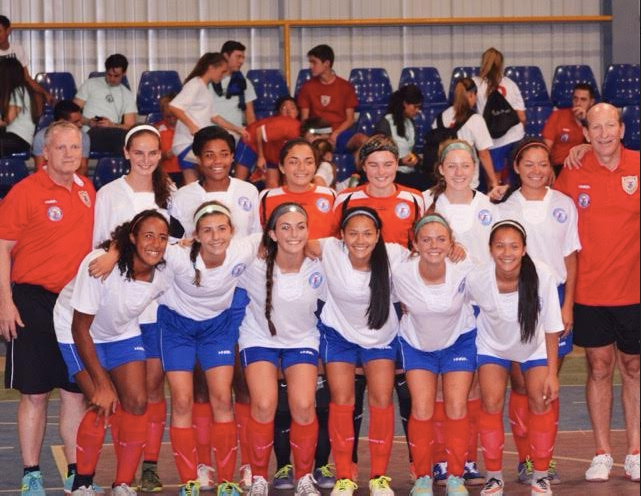
Forty-five million people in America live in poverty, which is nearly 15 percent of our population. Two years ago, I was one of those 45 million.
Life wasn’t easy when I was younger. I was part of a family of four, and my mom was struggling hard.
The very first day of school, I got off my bus to an empty bus stop with no mother waiting for me. I stood there for what felt like hours crying before trying to find my way home. When I got there, I walked inside to find my mother in bed. She had forgotten me.
That first day was typical.
My mother never picked me up at the bus stop. She didn’t look through my backpack, and she didn’t ever ask me how my school day went. When I got home each day, I made dinner for my sister, watched TV, and then went to bed. Over and over again, the pattern repeated. Wake up, go to the bus, go to school to eat breakfast and lunch. Come home, dinner, TV, sleep, repeat.
My teachers knew my predicament. I was a malnourished, dirty child. It wasn’t hard to tell I had problems at home. When I didn’t turn in my homework, they shook their heads at me.
Shake, shake, go home, repeat.
The federal policy, No Child Left Behind, made sure I stayed in school and wasn’t held back, something I’m quite grateful for now, but I wasn’t learning. I didn’t know the difference between right and left until the third grade. I was failing, but no one was telling me anything was wrong. I thought school was there so I could see my friends, eat food, and get out of the house.
Because I was impoverished, I felt my teachers looked at me as if I were a lost cause, and this is simply unacceptable.
Education for me was a way I could escape from the neglect and abuse I had to deal with on a daily basis. School gave me a chance to leave my house for a more supportive environment. Education also helped improve my self-confidence and mental stability. Being able to succeed in something that I knew was due to my hard-work and intelligence was very uplifting to me as a child, and now that I am a teenager, my good grades often reassure me that I am on the right track.
I still remember the first day I was confronted.
My teacher pulled me aside during class to talk to me. She looked at me sternly, “You are too intelligent to be doing this to yourself. If you don’t start using that brain of yours, you are going to put it to waste.” I was confused.
I didn’t understand what she meant. How could I put a brain to waste? Why did she even care? She smiled down at me.
“Let’s make a deal: if you do your homework tonight, I’ll give you a treat tomorrow.”
I nodded, and she allowed me to return to my seat. That afternoon, when I got off the bus I went home and sat at my table to do my homework, and the next day I turned it in. My teacher smiled and handed me a piece of candy. The day after this, I turned my homework in again just to see her smile at me.
I began to feel better about myself. People were telling me I was smart. I was talented. I was going to be something big someday. Later that year, I received the very brightest smile when handed my report card and told: “You’re a straight A student. I knew you could do it.”
Cathie Hammond, a PhD student funded by the Economic and Social Research Council and author of “The Effects of Learning On Self-Efficiency”, did a study on how education and learning can affect a person’s mental health. Her findings showed that learning can cause many people to have improved psychological health by helping them deal with extensively stressful situations. People who had been more passionate about their education seemed to be more level-headed when things got tough and were able to better reason than some of their less educated counterparts.
Education did something similar for me.
When I started learning, I began to realize that I was able to get out of my situation. I knew that I would not be stuck in the same cycle for my whole life, and that gave me an immense amount of relief and allowed me to better cope with the things going on around me.
That teacher set me on the track for success. I started participating more in class and doing every page of homework I was given. When teachers looked at me, they smiled. I was smart, everyone told me, and that felt good. I wanted to show everyone what I could do. I wanted to succeed and be somebody. My life had changed forever.
There was suddenly a world in front of me that I never knew was there, a world of possibilities. I was no longer another kid in the back of the room, destined to follow in the steps of my parents’ mistakes.
When people looked at me they didn’t see poverty, abuse, or neglect, they saw intelligence. All because of one teacher who taught how crucial an education is, the most important lesson of all.
I was put in foster care when I was 13, and I was happy. I was transferred to a new, better school with more activities to do. I was no longer held back by my home life, the constant yelling keeping me up at night. My foster parent was amazed by my success. I was one of very few children who cared and worked to strive and be better in everything, and I was simply ecstatic. Suddenly, I was the only one holding me back and there was a world of potential in front of me. I joined every club I could because I wanted to try everything.
I know the statistics.
Of the 400,000 children nationwide the U.S. Department of Education reports living in foster care, at least 20,000 will drop out from high school after their emancipation. Less than 10% of foster care youth graduate from college.
What that really means is that 20,000 teenagers who have struggled their entire lives will drop out from the one thing that could allow them to become successful.
When I became involved in after school activities, my grades weren’t the only thing that improved. I also became happier and more social. Being a part of something with people your age has tremendous effects. Making sure children have support in daily life to achieve their goals is just as important as teaching them in a classroom. This observation is bolstered by developmental psychologist Jill Posner whose research suggests that children involved in extracurriculars are more likely to make better grades and stay in school.
Today as a high school junior, I remain a straight A student and first in my class. I constantly strive to improve myself and my education to better my chances for success in college and in life in general. I have made it my goal to succeed and push other struggling young adults to succeed too. I believe that we all need to take a stand and reach out to all of the struggling youth around us.
Those of us on stable ground need to teach children that they are not their parents’ mistakes. They are not the clothes they wear; they are not how they grew up. They are who they make themselves to be. Improving a child’s life can be as easy as a few words. A simple “I believe in you. You can do it” or even a reprimand can go a long way for a child who has never had such words of caring directed at them.
A piece of candy! A ten-minute conversation. That is what set me on the path to success. I only wish more people could do the same thing for all of Kentucky’s struggling youth.

Grace Raber is a junior at Paducah-Tilghman High School and a member of the Prichard Committee Student Voice Team.
The opinions expressed on the Forum represent the individual students to whom they are attributed. They do not reflect the official position or opinion of the Prichard Committee for Academic Excellence or the Student Voice Team. Read about our policies.












